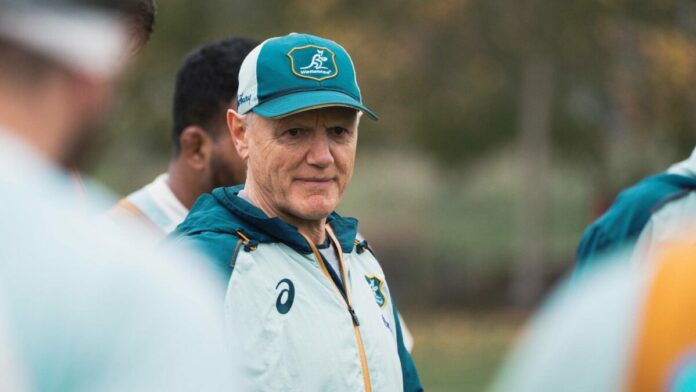
[ad_1]
A
Set small text size
A
Set the default text size
A
Set large text size
Joe Schmidt’s tenure as Wallabies coach hasn’t been the smash and grab of Eddie Jones nor injury-plagued reign of Dave Rennie.
Instead, we’ve seen the adoption of a simple and effective game plan and the slow (then rapid) evolution of players from promising talents to bonafide international stars.
He may not think it’s all about him – but the reality is within 12 months Schmidt has brought calmness and stability to a side that’s spent the better part of previous two years adrift on stormy seas.
However just as things are looking up for the Wallabies, Schmidt is seemingly looking for the door. Not in the same ilk as we lost our most recent gaffer – Schmidt has been very open about his commitment to his family and the impact his career has had on them.
Rugby Australia has long emphasized the significance of the “golden decade,” a period set to bring a host of marquee rugby events to Australian shores. However, the full potential of this era will only be realised through consistent success on the field, making Schmidt’s involvement undeniably crucial.
His contract runs until the end of the Lions series in July 2025 and while Rugby Australia seemingly have several contracting dilemmas to address, ensuring Schmidt sticks around should be top of the list.
Joe Schmidt (Photo by David Davies/PA Images via Getty Images)
With all of Schmidt’s honesty it seems unlikely that he would commit to a further extended period away from home, so it seems clear the only path forward for RA is one of compromise.
Though RA needn’t look far for a solution – with Cricket Australia’s answer to a cluttered and chaotic schedule one that should inspire the likes of Daniel Herbert and Phil Waugh to challenge rugby’s own status quo.
With Cricket Australia fully recognizing that the increasing time demands and pressures of coaching international cricket make the role less sustainable for any individual in the long term – their assembled coaching quartet of the recently re-signed Andrew McDonald, and assistants Andre Borovec, Daniel Vettori and Michael Di Venuto have formed a tight-knit group that can step in and out of the environment at any given time.
While McDonald sits atop the mantle as Head Coach, he’s been known to hand over the reigns to his assistants so he may rest and recuperate, all the while still juggling the duties of coaching a team playing three formats over nearly 100 scheduled days of international cricket in any given calendar year.
This occurred earlier in the year where Di Venuto stood in for the ODIs and T20s against the West Indies between the home Test series and tour of New Zealand, and also just this week – where Andre Borovec took charge of the T20 side during their whitewash of Pakistan.
It’s this set-up from which RA can and should draw inspiration, and anoint the successor to Joe Schmidt now and bring them into the fold as an assistant coach – under the proviso that for certain periods they are handed the keys to bus.
This will benefit Rugby Australia in two ways – firstly, it may allow us to retain Joe Schmidt through to the 2027 Rugby World Cup.
Joe’s made clear his desire to spend more time at home with his family – a set-up like this facilitates this desire.
The inevitable 2025 end-of-season tour is the perfect example of a period where Joe can remain at home and have his capable team of assistants pick up the reigns. He can return in 2026 as we build towards a touted Rugby Nations Championship, take another break in the 2026 July series and return again to prepare for the World Cup.
During these tours Joe can provide oversight and guidance remotely from his home while allowing his team to develop without him physically there.
The second benefit is it ensures continuity.
Be it Les Kiss, Dan McKellar or someone else – Rugby Australia should identify the person who will steer the ship beyond Schmidt’s reign and give them opportunities to cut their teeth without completely abandoning the systems that are just now beginning to bear fruit.
Rugby is a rapidly changing game but there is no reason to throw the baby out with the bathwater every World Cup cycle (or sooner in the case of the Wallabies). Promoting from within gives both the Wallabies and their fans a sense of certainty and safety that we haven’t had for a long time.
Until recently, this is something that had made the All Blacks so successful and ensured the transition from Sir Graham Henry to Sir Steve Hansen was as smooth as possible.
Continuity has also served the Springboks well following the resignation of Jacques Neinaber. Former Director of Rugby, Rassie Erasmas, formalised his heavy involvement in the national side by returning the head coach role and the strength of the Springboks has only grown.
If Rugby Australia is serious about building sustained success and capitalising on the opportunities of the golden decade, it must embrace innovation without abandoning stability.
A collaborative coaching model, with Joe Schmidt at the helm in a flexible role, offers the perfect balance between continuity and adaptation. The Wallabies have finally charted a clear course, and now it’s up to RA to ensure that ship stays steady and sails toward a truly golden decade.
[ad_2]
Copyright for syndicated content belongs to the linked Source link

